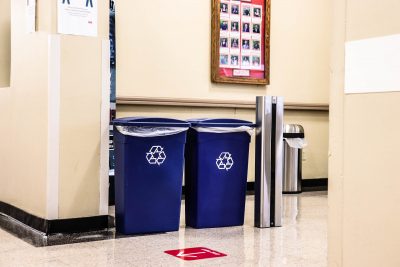
Students are asking Boston University to take its sustainability initiatives a step further by offering more opportunities to recycle on campus.
The University will work to implement recycling centers on every floor of the West Campus residences — Claflin Hall, Sleeper Hall and Rich Hall — this semester, Environmental Affairs Director Neha Chinwalla said. This comes after 423 students signed a petition to increase recycling resources across campus.
Student Government’s Environmental Affairs Department spearheaded the petition as part of its continued efforts to increase recycling infrastructure in West Campus, Chinwalla said, which dates back to 2019. Claflin, Sleeper and Rich currently have one recycling location each.
Sleeper resident Gauri Nema, a freshman in the College of Arts and Sciences, said she would like to see more recycling bins throughout her dorm.
“If there were more places to recycle, people wouldn’t be as lazy,” Nema said. “We would be more willing to recycle, instead of having to go down all the way eight floors.”
Chinwalla said adding more receptacles is doable, but the University needs to expend the financial resources to make it happen.
“Getting the actual bins on every floor would be pretty easy,” Chinwalla said. “That was why we were working to have this petition: to show the administration that it was something that students cared about, and that it was worth investing the money in.”
To advertise the petition last year, StuGov members circulated it on social media and tabled for signatures, according to Environmental Affairs Deputy Director Dan Kelly. He said the efforts were met with “a lot of excitement.”
“We go to a school that’s very forward- and progressive-thinking,” Kelly said. “Recycling accessibility is a must, and we saw that and we heard that from students who we were engaging with.”
sustainability@bu informed Chinwalla in September of the Zero Waste Task Force and Working Groups’ plans to increase recycling in Claflin, Sleeper and Rich, and to seek Environmental Affairs’ support.
With sustainability@BU now at the helm of the initiative, Kelly said Environmental Affairs’ role has changed to educating the BU community on how to properly recycle.
“Sustainability can really be an easy part of your life,” Kelly said. “If you’re here for four years, you can take that wherever you go, the lessons of sustainability that we’re able to provide.”
sustainability@BU Director Lisa Tornatore wrote in an email changes to BU’s waste reception system can be confusing, but the University is interested in helping students understand.
“We want to make sure that students have the resources they need to make good decisions about which bin to choose,” Tornatore wrote.
StuGov previously ran a campaign that resulted in the addition of recycling bins to every floor of Warren Towers in 2015. Chinwalla said Warren’s new system serves as a pilot for other BU residences.
The Zero Waste Task Force, which was established in 2019 to suggest solutions and actions for the University to achieve its goal of Zero Waste by 2030, Tornatore wrote, continues to include student input when making recommendations to BU.
“Working alongside students, and especially Student Government, helps us move BU toward a more sustainable future,” Tornatore wrote. “It is important that students continue to have a voice in sustainability issues on campus like this one.”
Chinwalla said Environmental Affairs hopes to tackle composting initiatives next, such as placing a compost drop-off location on campus.
“The University is more likely to listen to what students want rather than what faculty would want. We’re their customers,” Chinwalla said, “If students come together on an issue like this and care about it, it could actually make an impact.”


















































































































